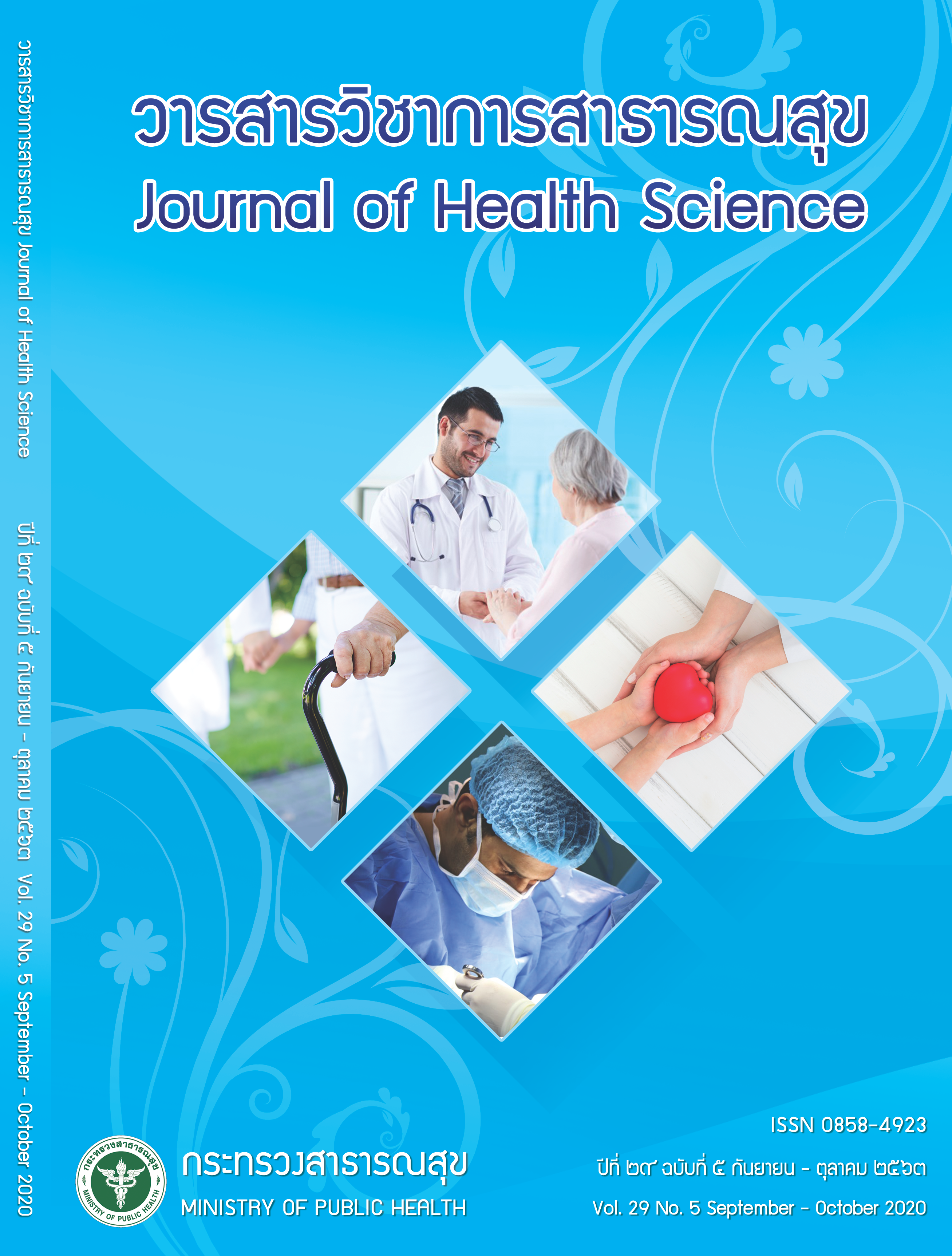The Action Research for Enhancing Health Literacy among Elderly in Nongtrud Sub-district, Trang Province
Keywords:
action research, health literacy, health behavior (food, exercise, emotion, smoking and alcohol cessation), elderlyAbstract
This action research aimed to enhance health literacy regarding health status and health behaviors (food, exercise, emotion, smoking and alcohol cessation) among the elderly in the Nongtrud Subdistrict, Trang District, Trang Province. Participants were purposively selected elderly residents of the first, second, third, and seventh villages in the Nongtrud Sub-district who aged 60-69 years old. One-hundred forty-seven participants, which was 75.38% of the target population, were recruited in the process of health literacy assessment. While 42 participants involved in activities for enhancing health literacy. The study was conducted from July to November 2018. Data were collected using participant observation and interviews. Instruments were the health status questionnaire and the health literacy and health behaviors (food, exercise, emotion, smoking and alcohol cessation) (revised version 2018) developed by the Health Education Division, Ministry of Public Health. The questionnaire showed acceptable internal consistency reliability with Cronbach’s alphas equal to 0.72. Percentage, mean, standard deviation, and the Wilcoxon match pairs singed-rank test were used to analyze data. After complement of activities for enhancing health literature within three month period, findings showed as follows: (1) access: participants were able to access health behaviors (food exercise emotion) information throughout joining activities, but lacked self-access to health information; (2) understand: health behaviors (food, exercise, emotion) post-test scores of participants increased significantly (p<0.001), and (3) apply: participants reported their experiences in utilizing knowledge and sharing information to others. Since the findings of this study indicated that some parts of health literacy among the elderly participants were increased, the elderly who have inappropriate health literacy and health behaviors should receive proactive activities individually.
Downloads
References
สภาขับเคลื่อนการปฏิรูปประเทศ. การปฏิรูปความรอบรู้และการสื่อสารสุขภาพ [อินเทอร์เน็ต]. กรุงเทพมหานคร: คณะกรรมาธิการขับเคลื่อนการปฏิรูปประเทศด้านสาธารณสุข และสิ่งแวดล้อม; 2559 [สืบค้นเมื่อ 5 มิ.ย. 2561] แหล่งข้อมูล: https://library2.parliament.go.th/giventake/con-tent_nrsa2558/d111459-03.pdf
คณะกรรมการอำนวยการจัดทำแผนสุขภาพแห่งชาติ ฉบับที่12. แผนพัฒนาสุขภาพแห่งชาติ ฉบับที่ 12 (พ.ศ.2560-2564) นนทบุรี: กระทรวงสาธารณสุข; 2559.
นิทรา กิจธีระวุฒิวงษ์. การนำความฉลาดทางสุขภาพไปปฏิบัติงานสาธารณสุข. วารสารวิจัยคณะสาธารณสุขศาสตร์ มหาวิทยาลัยขอนแก่น 2558;8(2):68-75.
อรวรรณ นามมนตรี. ความรอบรู้ด้านสุขภาพ (health liter-acy). วารสารทันตาภิบาล 2561;29(1):122-8.
ขวัญเมือง แก้วดำเกิง, นฤมล ตรีเพชรศรีอุไร. ความฉลาดทางสุขภาพ. กองสุขศึกษา กรมสนับสนุนบริการสุขภาพ กระทรวงสาธารณสุข. กรุงเทพมหานคร: สามเจริญพาณิชย์; 2554.
Kobayashi LC, Smith SG, O’Conor R, Curtis LM, Park D, von Wagner C, et al. The role of cognitive function in the relationship between age and health literacy: a cross- sectional analysis of older adults in Chicago, USA. BMJ Open 2015;5(4):e007222.
วรารัตน์ ทิพย์รัตน์, โสภิต สุวรรณเวลา. ความฉลาดทางด้านสุขภาพของผู้สูงอายุ อำเภอเมือง จังหวัดตรัง. รายงานการวิจัย. ตรัง: วิทยาลัยพยาบาลบรมราชชนนีตรัง; 2560.
อาเนช โออิน. ความฉลาดทางสุขภาพและพฤติกรรมสุขภาพของคนไทยที่มีอายุ 15 ปีขึ้นไป อำเภอนาโยง จังหวัดตรัง. วารสารการวิจัยการพัฒนาการบริหาร 2559;9(1):113- 32.
Stringer ET. Action research. 4nded. Los Angeles: Sage; 2013.
กองสุขศึกษา. แบบประเมินความรอบรู้ด้านสุขภาพและพฤติกรรมสุขภาพ ตาม 3อ.2ส. ของประชาชนที่มีอายุ 15 ปีขึ้นไป ฉบับปรับปรุงปี 2561 [อินเทอร์เน็ต]. กรุงเทพ-มหานคร: กรมสนับสนุนบริการสุขภาพ กระทรวงสาธารณสุข; 2561 [สืบค้นเมื่อ 5 มิ.ย. 2561]. แหล่งข้อมูล: http://www.hed.go.th/linkhed/file/558
ธัญญรัตน์ อโนทัยสินทวี, แสงศุลี ธรรมไกรสร, พัฒน์ศรี ศรีสุวรรณ. การทบทวนวรรณกรรมอย่างเป็นระบบเรื่องมาตรการป้ องกันการหกล้มในผู้สูงอายุ. กรุงเทพมหานคร: โครงการประเมินเทคโนโลยีและนโยบายด้านสุขภาพ; 2557.
Nutbeam D. The evolving concept of health literacy. Soc Sci Med 2008;67(12):2072-8.
กิจปพน ศรีธานี. ความสัมพันธ์ระหว่างความฉลาดทางสุขภาพกับคุณภาพชีวิตของผู้สูงอายุในภาคตะวันออกเฉียง-เหนือตอนกลาง. วารสารวิจัยระบบสาธารณสุข 2560; 11(1):26-36.
ขวัญเมือง แก้วดำเกิง. ความรอบรู้ด้านสุขภาพขั้นพื้นฐาน ปฏิสัมพันธ์ วิจารณญาณ. กรุงเทพมหานคร: อมรินทร์- พริ้นติ้ง แอนด์ พับลิซซิ่ง; 2562.
นิตยา เพ็ญศิรินภา. การเสริมพลังเพื่อการปรับเปลี่ยนพฤติกรรมเสี่ยงต่อโรคหัวใจและหลอดเลือด: แนวคิดและการปฏิบัติ. กรุงเทพมหานคร: จรัลสนิทวงศ์การพิมพ์; 2554.
Havighurst R. Successful aging. Gerontologist 1961; 1(1):8-13.
Centers for Disease Control and Prevention. Improving health literacy for older adults: a provider perspective in improving health literacy for older adults: expert panel report. Atlanta: US Department of Health and Human Services; 2009
Downloads
Published
How to Cite
Issue
Section
License

This work is licensed under a Creative Commons Attribution-NonCommercial-NoDerivatives 4.0 International License.







